- Home
- Jeff Gunhus
Imminent Threat
Imminent Threat Read online
Books by Jeff Gunhus
SILENT THREAT
IMMINENT THREAT
Published by Kensington Publishing Corp.
IMMINENT THREAT
JEFF GUNHUS
www.kensingtonbooks.com
All copyrighted material within is Attributor Protected.
Table of Contents
Also by
Title Page
Copyright Page
Dedication
CHAPTER 1
CHAPTER 2
CHAPTER 3
CHAPTER 4
CHAPTER 5
CHAPTER 6
CHAPTER 7
CHAPTER 8
CHAPTER 9
CHAPTER 10
CHAPTER 11
CHAPTER 12
CHAPTER 13
CHAPTER 14
CHAPTER 15
CHAPTER 16
CHAPTER 17
CHAPTER 18
CHAPTER 19
CHAPTER 20
CHAPTER 21
CHAPTER 22
CHAPTER 23
CHAPTER 24
CHAPTER 25
CHAPTER 26
CHAPTER 27
CHAPTER 28
CHAPTER 29
CHAPTER 30
CHAPTER 31
CHAPTER 32
CHAPTER 33
CHAPTER 34
CHAPTER 35
CHAPTER 36
CHAPTER 37
CHAPTER 38
CHAPTER 39
CHAPTER 40
CHAPTER 41
CHAPTER 42
CHAPTER 43
CHAPTER 44
CHAPTER 45
CHAPTER 46
CHAPTER 47
CHAPTER 48
CHAPTER 49
CHAPTER 50
CHAPTER 51
CHAPTER 52
CHAPTER 53
CHAPTER 54
CHAPTER 55
CHAPTER 56
CHAPTER 57
CHAPTER 58
CHAPTER 59
CHAPTER 60
CHAPTER 61
CHAPTER 62
CHAPTER 63
CHAPTER 64
CHAPTER 65
CHAPTER 66
CHAPTER 67
CHAPTER 68
CHAPTER 69
CHAPTER 70
CHAPTER 71
CHAPTER 72
CHAPTER 73
ACKNOWLEDGMENTS
This book is a work of fiction. Names, characters, businesses, organizations, places, events, and incidents either are the product of the author’s imagination or are used fictitiously. Any resemblance to actual persons, living or dead, events, or locales is entirely coincidental.
KENSINGTON BOOKS are published by
Kensington Publishing Corp.
119 West 40th Street
New York, NY 10018
Copyright © 2021 by Jeff Gunhus
All rights reserved. No part of this book may be reproduced in any form or by any means without the prior written consent of the Publisher, excepting brief quotes used in reviews.
To the extent that the image or images on the cover of this book depict a person or persons, such person or persons are merely models, and are not intended to portray any character or characters featured in the book.
The K logo is a trademark of Kensington Publishing Corp.
ISBN-13: 978-1-4967-2624-7 (ebook)
ISBN-10: 1-4967-2624-3 (ebook)
ISBN: 978-1-4967-2623-0
For Nicole
Because they are always for you
CHAPTER 1
Jacobslav Scarvan realized too late that his countrymen meant to kill him. The surprise wasn’t that the entire voyage out to the middle of the Aegean Sea on a godforsaken fishing trawler had been an elaborate trap, but that his comrades had possessed the imagination to pull it off.
Which meant they’d had help.
And if they had, it meant the list of men he would need to kill after this was done was going to be long indeed.
The trawler heeled to the side as it dipped into the trough of a wave. Water broke over the bow as it plowed through, hurtling a sheet of cold seawater across the deck. The three men in front of him staggered from the force of it.
Scarvan didn’t move.
“Jacob, this is ridiculous. Let’s go inside and talk.” Viktor Belchik looked pathetic, clutching his sopping wet coat at the collar, squinting as the wind from the storm whipsawed around them. His thin hair, usually dutifully combed over to cover his spotted scalp, was pasted over his ear and cheek. Scarvan had once thought of this man as mentor and father. Part of his heart broke that his own personal Judas would be the one person in the world he trusted most.
“Let’s do it here,” Scarvan said, spreading his feet wider, a strong base to compensate for the violent rocking of the deck.
He turned his body into a side profile to offer less of a target. At six foot three inches, this was no mean feat. He was broad-shouldered, still muscular from his grueling daily workouts even at the age of fifty-two. His gray hair was cut short so it didn’t obscure his vision as the rain and wind buffeted him. He knew his dark Serbian features—heavy brow, thick lips, brooding eyes—would work to his advantage as he scowled at the men facing him. Anyone from the world of espionage knew to fear him. The two particular men standing in front of him had worked with him before. They knew enough to be terrified.
The men took a position on either side of Belchik and reached for their firearms holstered at their sides. They didn’t pull them out.
Scarvan knew these men, Demetri Acha and Sergei Kolonov. They were good operatives, fast and accurate, lethal killers. They should be. Scarvan had trained them himself.
“You’re paranoid!” Belchik shouted. “Just as I taught you to be. But this is madness. Why would I want to terminate my most powerful asset? What sense does it make?”
Scarvan felt nearly embarrassed for his old mentor. They both knew how the game ended for men like him. He possessed too many state secrets, knew where too many of the bodies were buried, both figuratively and literally. Eventually, Mother Russia would want her house put in order. Men like him either timed it right and disappeared one day to live out their lives in some remote village or island, or they were terminated.
Looked like his timing had been off.
And, in retrospect, as he stood on the bucking deck in the middle of a storm, he had a good idea why.
“It’s because of the Americans, isn’t it?” Scarvan asked.
Belchik’s eyes betrayed him. His demeanor changed, a man who’d made a decision.
“Yes,” he said.
Scarvan gave a slight nod, acknowledging the honesty. A bolt of lightning cut across the sky, followed immediately by a crash of thunder that shook the boat. Scarvan took notice of the reactions from both Acha and Kolonov. Any advantage he could spot was going to count in the next few seconds. Unfortunately, neither man flinched at the thunder.
“Who gave the order?” he asked.
“What does it matter?” Belchik said.
“To me, it matters.”
Belchik lost his balance as another wave hit and he staggered backward. Once he regained his footing, he was next to a metal support column for the balcony on the second-floor deck. He slid his body over so that his vitals were protected. The movement had been orchestrated and perfectly executed. Scarvan had to admit it was a nice move by the old man.
“Was this your decision?” Scarvan asked.
“I follow orders,” Belchik said. “We all follow orders.”
“Look around,” Scarvan replied, gesturing to his surroundings. “You can see where that gets you.”
He’d spent a lifetime following orders. Who to kill. Who to maim. Who to take
apart piece by piece until they spilled their secrets. He’d killed for his country for three decades. And now she wanted to kill him.
“This comes from the highest levels,” Belchik said. “After the operation in America, reprisals were demanded.”
Scarvan nodded. He’d been the sacrificial lamb offered for the slaughter. Again, the only surprise he felt was that he hadn’t seen it coming. He’d resisted the idea that at age fifty-two he’d lost his edge. But tonight was proof that he’d not only done that, but he’d somehow turned dull, inured by overconfidence and ego that had made him think he was beyond this kind of treatment.
Killing the two American agents on their home territory hadn’t been the mistake. That part was fair play in the dangerous game in which they all played. It was making the two men watch as he tortured their wives and children alive that had been a step too far. There had been poetry in the act, a Biblical sense of eye-foran-eye given the operation the two agents had executed in Bulgaria. A bomb where innocent women and children had been killed. Why were these men’s families any more important than those killed in the collateral damage from their bomb? But he should have understood that the act would be taken as too personal, too outside the convoluted rules they all followed.
“The children. It was too much, Jacob. There was nothing I could do,” Belchik said. “You were not authorized to do such a thing.”
Scarvan took note of the denial. It was bullshit, they both knew it. He never had limits put on him and his handlers had always encouraged his ruthlessness. Demanded it. Belchik was speaking to someone else.
Scarvan raised his eyes to the balcony one story above the back deck where they stood. The lights didn’t penetrate to a spot in the center. He didn’t think it was an accident.
“I’m sorry, Jacob. It’s over,” Belchik said.
The old man looked to Acha and Kolonov as if it were their cue to complete the task. But they didn’t move. Scarvan didn’t mistake their hesitation for compassion or internal conflict about killing their teacher.
No, they hesitated because they knew his capability. If they both pulled their weapons, they would be able to kill him. But at least one of them would die in the process and the other would likely be wounded. Whoever drew first would be the one Scarvan would kill.
Neither wanted to go first.
That was a fatal mistake.
Scarvan timed his move with the next big wave that slammed into the ship. As it crashed over the bow, he ducked down and rolled to his right, his Sig Sauer out of its holster and in his hand as the wall of water hit them.
Acha and Kolonov jumped toward cover, guns out.
Scarvan took aim but waited. The ship’s nose dipped into the next trough, sending his targets downward. In the split second before the trawler climbed back up the next wave face, the deck was flat and stable.
He squeezed the trigger and Acha’s head jerked back, the spray of blood visible even in the storm. He turned to look for Kolonov.
Then the unexpected happened.
Searing pain shot up his arm as his gun flew from his hand. He clasped his wrist. It felt like it was on fire. He had been shot enough times to know the feeling. But where had the shot come from?
He reached for his backup weapon strapped to his ankle. The Glock 22 was not as effective as his Sig Sauer. Before he could grasp it, another bullet tore into his calf, shattering bone and flesh.
He cried out. He could take the white-hot pain, he’d endured far worse, but he knew he was now in real trouble. The problem was the precision of the shooter. Whoever it was had placed two perfect shots in a row on a moving deck in the middle of a storm. That wasn’t good.
Scarvan grunted as he pushed back the flap of skin that used to be his calf, digging for his gun. Triumph surged through him as he felt it on the deck next to him. He wrapped the fingers from his good hand around it and lifted it toward the balcony.
The shooter had to be there. It’s where he would be if—
Scarvan’s shoulder exploded. This time he saw the muzzle flash come from the balcony. The riot of pain a small consolation for being right.
He dropped his weapon and it skittered across the deck.
Unarmed and shot three times, Scarvan fell to his knees in the center of the deck.
He saw Kolonov train his weapon on him, but then a new voice called out.
“No, wait.”
Scarvan raised his head to see a man step out from the shadows of the trawler’s cabin. He was similar in age to him, wearing a black trench coat and a hat pulled low. Still, he knew immediately who it was. James Hawthorn. CIA.
Scarvan glanced up to the balcony. He saw the shooter now, covering him as Hawthorn approached. If Hawthorn was here, in person, he knew the identity of the shooter.
Scott Roberts.
It had to be. He was the best Hawthorn had and it explained the precision of the shots so far. One move and he’d get a bullet in the head, he had no doubt.
Hawthorn stopped short of him, far enough to be safe. Close enough to gloat over his pain.
“The agents you killed, they were my friends,” Hawthorn said. “But we all understand the risks of our profession. But you tortured their families. Burned them alive one by one. You brought great dishonor on your country.”
Scarvan spat on the deck between them. “I’m going to kill you,” he said. Then he cried out, “I’m going to kill all of you, I swear it!”
Hawthorn sneered. “You’ll have to come back from the dead to do it.” Without taking his eyes off Scarvan, he said, “Kill this miserable piece of trash.”
The trawler hammered into a wave. The ship shuddered like it’d glanced off a solid wall. It was the chance Scarvan had been waiting for. He jumped to his feet and ran. A shot fired and he heard the round zip past his right ear. He didn’t think he would be as lucky with the next bullet.
He reached the port side of the trawler and dove headfirst over the railing. As he fell, another shot slammed into his leg.
Then he hit the cold water.
His body reacted with a sharp inhalation. He sucked down seawater and then coughed it back up. A wave crashed on him and he was underwater, struggling to swim with his damaged leg and blown-out shoulder.
He fought back to the surface. When he came up, he saw searchlights from the trawler stretching like fingers across the water. But he was already far away from the ship. There was no way they were going to find him.
But it felt like an empty victory. As another wave pushed him back underwater, he felt like he’d accomplished nothing more than to choose the manner of his own death.
If it was meant to be that way, then so be it.
But if he did survive somehow, if he made it through, he was going to enjoy punishing each one of the people on that boat.
Like Hawthorn said, even if he had to come back from the dead to do it.
CHAPTER 2
Father Spiros climbed daily down from his home high over the water, navigating the rope ladder to the rocky landing twenty feet below. It was his daily habit of several decades to walk the stretch of stone shoreline beneath his skete, the ancient hermit dwelling built into the cliff rising from the Aegean.
Sometimes the sea delivered useful items to him. A length of fishing net. A fish stranded on the rocks that became his supper. A piece of castaway clothing.
He’d been a fit, athletic man, a soldier in the Greek army during the war against the Nazis. At seventy years old, he was a gheronda, a respected elder among the monastic community. He was fit for his age, wiry and lean, stronger than his long gray beard and wrinkled face indicated. His daily walks on the uneven ground kept him healthy. He enjoyed it most after a storm, interested to find whatever the sea had delivered from the depths after it had raged.
On his regular path he’d found a length of good rope, two bottles of a beautiful blue color in which he would put flowers. It was much farther up the shore than he normally walked when Father Spiros found the body.
; At first, he didn’t think the shape on the rocky shore was a man. Certainly, it was something out of place. A pile of dark brown seaweed perhaps. Or some trash from one of the tankers that passed by the shores. But as he came closer, he made out the outline and knew what it was.
The body was on its side and had its feet pointed toward land with its head near the water. The man had not crawled out, but rather had been washed ashore. Clear evidence he was likely dead.
And it was a man. Even sprawled on the rocks in wet clothes, one arm bent back at an impossible angle, clearly broken or separated at the shoulder, the figure’s muscular bulk was apparent.
Spiros walked to the other side of the body to look at the face.
The man appeared Slavic, with a heavy brow and high forehead. Thick hair pasted to his scalp. His mouth hung open, revealing teeth covered in blood. The man’s eyes were closed, which gave Spiros pause. He’d seen more than his share of death and he’d expected to see the man staring blankly into the sky.
Unless . . .
Carefully, he kneeled beside the man and placed his hand near his mouth. He thought he felt the barest hint of warm breath but couldn’t be sure.
He reached to the man’s neck and pressed his fingers there, digging for a pulse.
As he did, the old man’s other hand pulled back the man’s shirt. It was soaked red with blood. He looked quickly back up to the man’s face.
The eyes were open.
Spiros cried out as the man snapped at him with his teeth. Gnashing at him like a wild animal.
The man’s feet kicked. He groaned and vomited a foul-smelling mix of blood, bile and seawater. Then his entire body spasmed, shaking violently. Spiros placed a hand on the man’s shoulder and gripped it tight.
“Isychia. Isychia,” he said. Quiet, quiet.
The man’s eyes rolled back in his head, closed, and he went still.
Spiros reached again for the man’s neck, ready this time in case the man tried to bite him again.

 Silent Threat
Silent Threat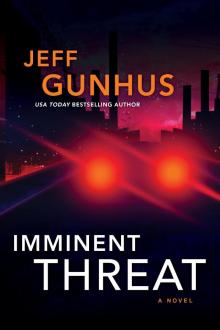 Imminent Threat
Imminent Threat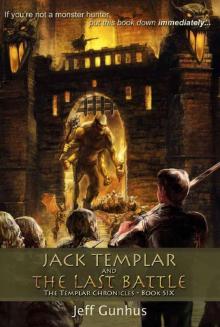 Jack Templar and the Last Battle
Jack Templar and the Last Battle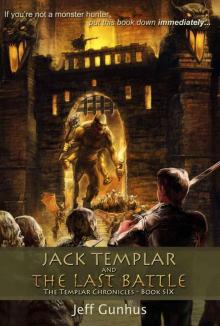 Jack Templar and the Last Battle (The Jack Templar Chronicles Book 6)
Jack Templar and the Last Battle (The Jack Templar Chronicles Book 6)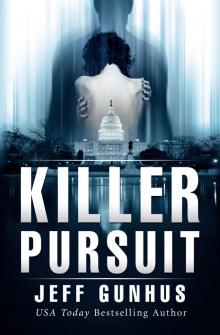 Killer Pursuit: An Allison McNeil Thriller
Killer Pursuit: An Allison McNeil Thriller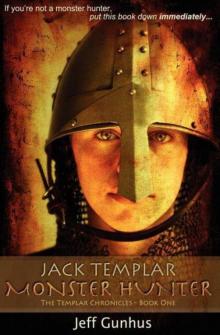 Jack Templar Monster Hunter
Jack Templar Monster Hunter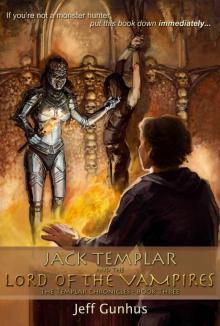 Jack Templar And The Lord Of The Vampires (The Templar Chronicles)
Jack Templar And The Lord Of The Vampires (The Templar Chronicles)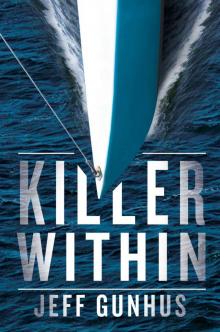 Killer Within
Killer Within The Torment of Rachel Ames
The Torment of Rachel Ames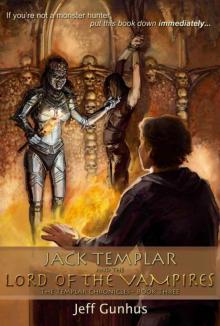 Jack Templar and the Lord of the Vampires
Jack Templar and the Lord of the Vampires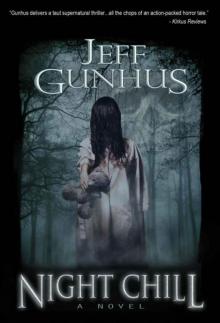 Night Chill
Night Chill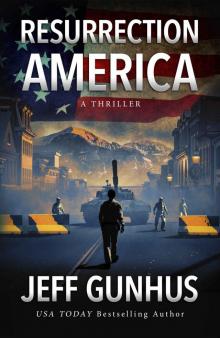 Resurrection America
Resurrection America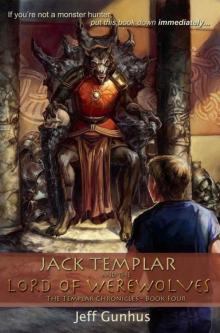 Jack Templar and the Lord of the Werewolves (Book #4 of the Templar Chronicles)
Jack Templar and the Lord of the Werewolves (Book #4 of the Templar Chronicles)